
– 17/12/2023 –

Gospel text : John 1:6-8, 19-28
vs.6 A man came, sent by God. His name was John.
vs.7 He came as a witness, as a witness to speak for the light,
so that everyone might believe through him.
vs.8 He was not the light, only a witness to speak for the light.
vs.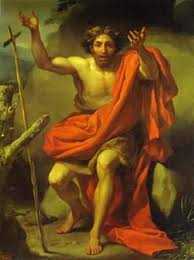 19 This is how John appeared as a witness. When the Jews sent priests and Levites from Jerusalem to ask him,
19 This is how John appeared as a witness. When the Jews sent priests and Levites from Jerusalem to ask him,
“Who are you?”
vs.20 he not only declared, but declared quite openly,
“I am not the Christ.”
vs.21 “Well then,” they asked “are you Elijah?”
“I am not” he said. ”
Are you the Prophet?” He answered, “No.”
vs.22 So they said to him, “Who are you? We must take back an answer to those who sent us. What have you to say about yourself?”
vs.23 So John said, “I am, as Isaiah prophesied: a voice that cries in the wilderness: ‘Make a straight way for the Lord.'”
vs.24 Now these men had been sent by the Pharisees,
vs.25 and they put this further question to him, “Why are you baptising if you are not the Christ, and not Elijah, and not the Prophet?”
vs.26 John replied, “I baptise with water; but there stands among you – unknown to you –
vs.27 the one who is coming after me; and I am not fit to undo his sandal strap.”
vs.28 This happened at Bethany, on the far side of the Jordan, where John was baptising.
****************************************************************
We have three commentators available from whom you may wish to choose . Please scroll down to the name of the commentator required.
Michel DeVerteuil Lectio Divina with the Sunday Gospels – Year B
Thomas O’Loughlin Liturgical Resources for Advent& Christmas
Donal Neary Gospel Reflections for Sundays of Year B
*******************************************************************
Michel DeVerteuil
Lectio Divina with the Sunday Gospels
www.columba.ie
General Comments
This passage is clearly in two sections: the is an extract from the first prologue to St John’s gospel, and the second is from St John’s account of the ministry of John the Baptist.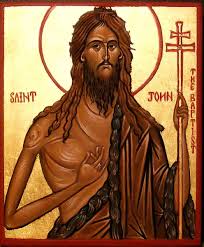
To get the full meaning of verses 6 to 8 it would be necessary to go back to the previous verse of the prologue in which St John affirms that light always shines in the dark and darkness cannot overpower this light. In this perspective the passage says that John was sent by God with the mission to “speak for the light,” a powerful metaphor of a lawyer bearing testimony that the light is trustworthy.
Textual Comments
Verses 19 to 21 give us a first dialogue between John the Baptist and the people whom St John calls “the Jews”, meaning those who are reluctant to accept God’s word. Enter into the personality of the Baptist as he, with growing impatience, refuses to allow himself to be put into any categories – a model of the great person establishing his own unique identity, just as the messengers are like us when we try to fit God’s new word into some time-worn category, putting new wine into old wineskins.
In verses 22 to 24 the story moves forward with John again refusing to let himself be categorised and affirming his mission humbly but courageously. He must reach out into the wilderness and let God’s saving word be heard among those who were neglected by the religious leaders of the time.
Verses 24 to 27 show us once more the humility of John the Baptist, using the same metaphors we had in last Sunday’s passage, although here we have in addition the contrast between him and “Christ”, “Elijah”, and “the prophet“. Let yourself be touched also by the Baptist’s conviction (not mentioned in St Mark’s account) that  “the one who is to come after” is actually standing there even though the community does not see him.
“the one who is to come after” is actually standing there even though the community does not see him.
Verse 28 is very symbolic: John is baptising on the far side of the Jordan, far away from the religious centres of the time.
Prayer Reflection
Lord, there is much darkness around us in society, in our church community, in our family, in our own hearts. Eventually it gets us down. We become cynical and settle for mediocrity.
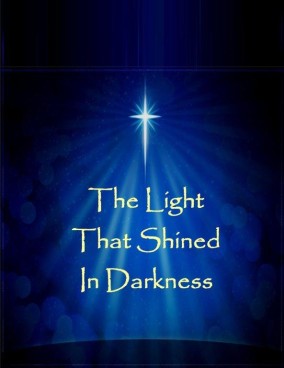 We thank you that someone always comes on the scene, sent by you as a witness to speak for the light:
We thank you that someone always comes on the scene, sent by you as a witness to speak for the light:
– on the world scene, people like Gandhi, or Martin Luther King, 0r Mother Teresa;
– in our own country, teachers, workers, community leaders;
– a grandparent, or a parent, or a friend,
or one of our own children, .
They bear witness to the rest of us that somewhere in the dark a light always shines,
a light that darkness cannot overpower,
and therefore we can all believe again.
Lord, goodness is always small, very frail and vulnerable,
whereas evil is loud and self-assertive, dominating the news and our conversations.
We pray that your church may always speak for the light,
so that through her people might believe.
Lord, we get frustrated when we see the shortcomings of our church,
or our own personal shortcomings. That is because we have become self-important, forgetting that we are not the light, only witnesses to speak for the light.
Lord, when someone speaks your word to us,
we look for endless reasons not to respond, we put the person into a category –
“the same old message,” we say, “just another of those do-gooders,
we have heard it all before.”
We thank you for the times when your word became something new,
a voice penetrating right into the wilderness we were in,
so that we heard it and entered into a new relationship with you.
Lord, forgive us that we have confined your word to some restricted areas
whereas we leave others untouched:
* the world of economics and politics is cold and heartless;
* the food policies of the wealthy nations are causing famine among the poor;
* workplaces know only suspicion and confrontation.
Help us to be your voice crying out in those wildernesses
that you want to be present there too with your love and compassion,
and they must open themselves to you.
 Lord, we feel incompetent.
Lord, we feel incompetent.
We ask ourselves how we can be preaching your gospel when we are so far from being the Christ,
a great prophet like Elijah, or the promised Messiah.
Help us to be content to baptise with water,
trusting that you are standing with us even though we do not experience your presence,
that you will come after us and put right all we have done wrong,
and we are not fit to undo your sandal strap.
Lord, forgive us that we become complacent in your church,
as if grace is at work among us only.
Forgive us too that we become discouraged when we find the church not doing enough.
Remind us that John is baptised on the far side of the Jordan.
********************************************************
Thomas O’Loughlin
Liturgical Resources for the Year of Matthew
www.columba.ie
Introduction to the Celebration
Today is the day of John the Baptist. He was the last of the prophets whose mission was to bear witness to the Lord when he came among his people. He prepared the way for the Anointed One and pointed him out. Today John is the model for every one of us: we are called be prophets in our world; we are called to bear witness to the Christ; in the wilderness of human greed, injustice, and falsehood we are called to make straight the way of the Lord.
Homily Notes
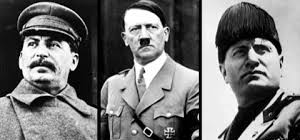 1. The last century has been littered by people who have claimed to have all the answers to the great human questions and who are only too willing share their ‘wisdom‘ with everyone else.
1. The last century has been littered by people who have claimed to have all the answers to the great human questions and who are only too willing share their ‘wisdom‘ with everyone else.
There have been the great dictators: Lenin, Hitler, Stalin, Mussolini, Mao and their successors – they knew what the world needed and left a trail of destruction in their wake which remains to this time .
Then there was a veritable army of lesser despots who knew the answers for everyone and were prepared to put up with any amount of suffering to impose their expert solutions.
Then there are the experts in personal affairs: how to get this right, or to do that properly, or how to be successful or slim or happy in ten lessons. All you have to do is buy their book or video and follow the instructions.
At this time of year there are even a slew of books on how to have the perfect Christmas, or Christmas party, or perfect Christmas cooking! All these experts have something in common: look to me, I will solve your problems.
And, of course, there is no shortage of religious experts of every make and shape who have a sure-fire, quick and simple route to happiness and bliss.
2. Faced with such experts, many of us instinctively recoil for there is something deep inside us that says it cannot be a simple as that or there would not be such bother or that life is always more complex than the clarity provided in the various expert solutions. On the other hand, many of us faced with the complexity of the world and its problems long for a simple solution that will deliver security, clarity, and some happiness. So the experts are never without disciples (or people at least willing to listen to them or buy their books): and for many of the ‘experts’, that is success enough.
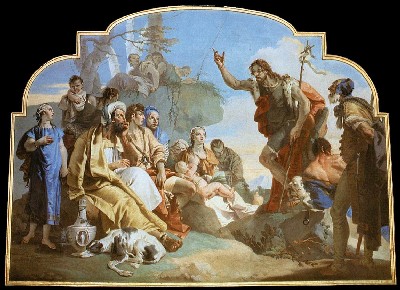
“The Christ …the thong of whose sandal I am not worthy to untie”
3. John the Baptist is not such an expert. John the gospel-writer decisively moves the focus from him to the Anointed One. The Baptist’s vocation is to point away from himself to the Lamb. He is the witness to the truth, not its possessor. He is the way-maker, not the way. Faced with both those who would discredit him as a another religious fraud, or those who would adopt him as their saviour and leader, he makes the same response: ‘I am not the Christ … but among you stands one whom you do not know … who comes after me, the thong of whose sandal I am not worthy to untie.’
4. Here lies the style of the witness of everyone who recognises the Christ: we point away from ourselves and towards the One who is to come, the One who brings the universe to its completion.
5. But does this mean that we present ‘Jesus as the answer to everything’? This is certainly a mode of witness that many Christians are eager to adopt. Jesus has the answer to every one of life’s problems. Jesus will make you happy. Jesus will make you secure. Jesus will give you the answers to all your questions from where the universe came from to what is the best way to vote. Or as the old school joke has it: whenever a religion teacher asks you a question, the safest answer to give is ‘Jesus‘. The ‘Jesus is the Answer’ of advertising hoardings is not the Jesus we hear proclaimed in John’s gospel.
6. For John the gospel-writer Jesus is the way and that begins in a wilderness and while it does end in triumph, that triumph is the cry ‘It is completed‘ upon the cross. As John pointed beyond himself and bore witness to the Christ, the Christ points beyond himself and bears witness to the Father (Jn 5:33-36). The Anointed One does not invite us to adopt a set of answers, much less sure-success remedies to life’s problems, but to embark on his way, to adopt his style, and to begin that journey from the midst of whatever wilderness we inhabit.
7. His way is the way of justice, gentleness, peace, and integrity. The Anointed One, the Christ, fulfils the prophecy of Isaiah, and commends it to his followers as their way. For the spirit of the Lord has been given to us, we have been anointed so that we are made part of the whole Christ:
The Lord has sent me to bring good news to the poor, 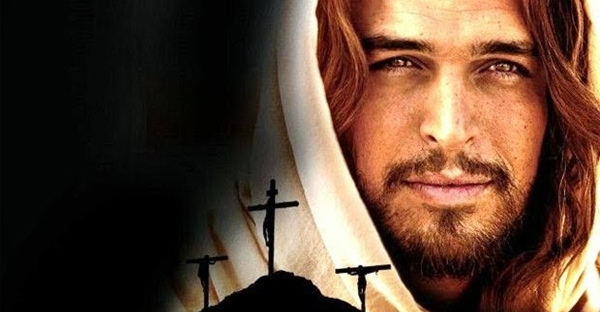
to bind up hearts that are broken,
to proclaim liberty to captives
and freedom to those in prison,
to proclaim a year of favour from the Lord.
****************************************
Donal Neary
Gospel Reflections for Sundays of Year B
ww.messenger.ie/bookshop/
The Joy of Waiting
Advent is a time of joy – joy in the waiting and this Sunday we wear the joyful rose-coloured vestment. The messenger in the first reading is the ‘joyful messenger’, and his joy is that God is near and God is coming.
This would be the message of Jesus –that he was the joyful messenger of his Father’s love.
He would be the shepherd – the one who cares, knows and actively looks after the sheep.
John the Baptist is the voice of joy and energy, preaching the new message.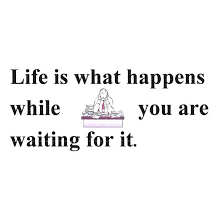
Voices of Advent to bring God near – The central message within all the voices of Christmas.
God’s Christmas voice is saying
‘I love you, you are all brothers and sisters, and nothing except love is final.’
Not just a voice…but actively loving in word and deed. One way of touching that love is the Mass. Jesus is not really love from the sky, but food of the Eucharist, that nourishes us and makes a difference. We bring our ordinary concerns to Mass, and let God lighten them and transform them, and enlighten us with his word. The voice of God makes sense of and brings light into the ordinariness of life.
God is present in his word, and in his body – we wait in joy for the Word to be made flesh.
Remember this week what makes you joyful about the coming
feast of Christmas and be grateful.
Lord I believe your word was made flesh and appeared among us.
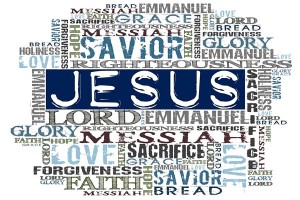
************************************